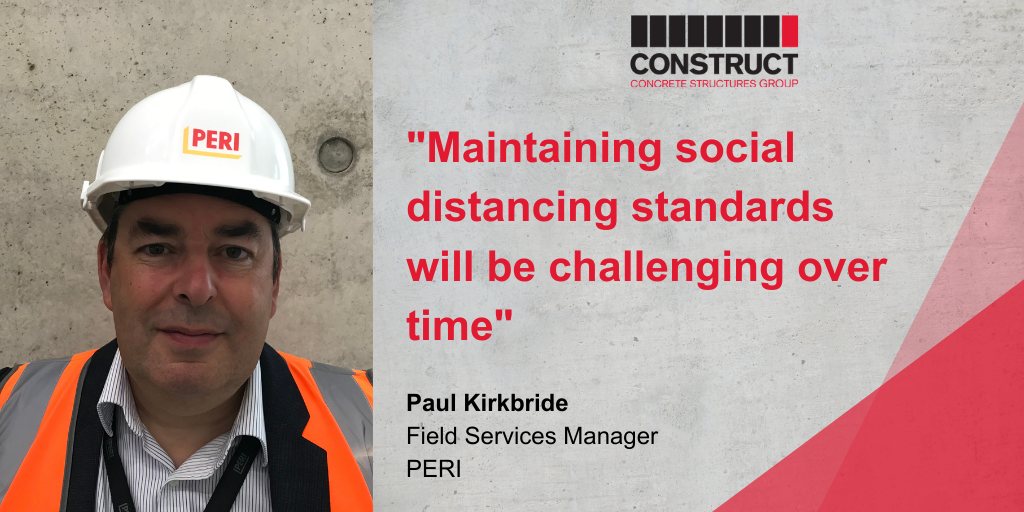
Have you seen changes to health and safety practices in the workplace, due to COVID-19?
In my experience, health and safety onsite is not very different to how it was before the pandemic. The main differences I’ve seen have been the use of one-way systems onsite; in some canteens, areas have been partitioned off and outdoor tables will have fewer people seated at them. On the sites I’ve visited, there has been no requirement for wearing masks, except when it’s obligatory for a task like using a grinder or cutting concrete. I also haven’t seen any restrictions on the number of people allowed onsite.
At PERI, we’ve put measures in place to make sure our products can be used within social distancing guidelines. For example, operatives can erect scaffolding structures whilst maintaining a safe 2m distance where possible. Onsite there are hand sanitation facilities everywhere but there is no shaking of hands, as you normally would, even though we are wearing gloves anyway.
But I think the lack of obvious changes is due to the improvements that have been made on that front in construction over the last few years. I don’t think that COVID-19 has prompted a massive jump forward in health and safety standards because the standards were improving anyway. It’s difficult to improve on something that is already at a high level.
What have been the biggest challenges for the industry since lockdown began?
Social distancing onsite can be very difficult. Another issue is travelling to and from the site. People are being encouraged to use their own vehicles where they can, rather than public transport. But for those workers who need to travel to inner city sites, I think it’s certainly easier now than it was earlier in the year. When I’ve travelled on the London underground, there have been no problems with social distancing or crowding. Construction workers tend to have earlier starts and later finish times than other industries, so they may miss the rush hour.
Has the coronavirus pandemic brought about any unexpectedly positive changes?
Not that I’ve seen in my particular role, but I would say that the increase in people working from home is an improved working practice. There has been less travelling, less stress and possibly an improved output when people work from home. At PERI we have migrated to Microsoft Teams for online meetings and phone calls; we’ve held Concrete Frame Training Forum (CFTF) meetings via Zoom, which means that people are taking less time out to travel. Sometimes people want face-to-face meetings, but perhaps we’ll see people working in the office for, say, three days a week – which would have a good environmental impact too. We’ve proved people can work at home as effectively as they can at the office, which is definitely a positive change. We have been doing online customer introductions, product presentations and demonstrations, even internal training has been carried out via webinars – eliminating travel time and utilising employees’ time effectively.
Has COVID-19 changed your approach to mental health issues at work?
At PERI, we have a mental health helpline that people can ring for assistance and there are mental health first aiders in each office. Many people, especially men, are often reluctant to talk about mental health issues. But if you can get people talking, that’s really good. Sometimes, just to have somebody listen is a big help.
Personally speaking, I was on furlough for four months and at times it was quite challenging, mentally. I was in constant contact with my team and was updated regularly on the situation. Although I was still speaking to people at work, I wasn’t actually seeing my colleagues. I was lucky in that I had my family at home with me, but I would imagine that people who were living on their own may have found it extremely difficult.
There was a lot of information coming out of CONSTRUCT, from the HS&E manager Dave Armsworth, all about mental health awareness. I think that CONSTRUCT have done a really good job on mental health.
Looking forward, what are the main challenges facing the industry?
There may have to be a new norm in terms of office-based personnel working at home. Perhaps not all the time, because I think we still need some degree of personal interaction, but people may work in the office less often and with staggered schedules. However, this new approach can only be achieved by people who have an environment at home where they can work successfully. It will be much more challenging for people who don’t have a spare room to turn into an office, or who have young children to look after, for example.
Maintaining standards of social distancing will also be challenging over time, although personally I can see masks becoming a normal part of PPE.
What other benefits have you seen from being a member of CONSTRUCT?
The amount of information that has been distributed amongst members did increase during lockdown and it was all useful, so it would be great if that could continue at the same level in the future. When we have meetings, the sharing of information even among competitors has been pretty good. Any details that people share about things that have happened on their site are not used in a negative fashion – it just helps to make others in the industry aware of issues, so perhaps they can change their work practices too. That is valuable and I would like to see that continue.
You can download the PDF interview here.